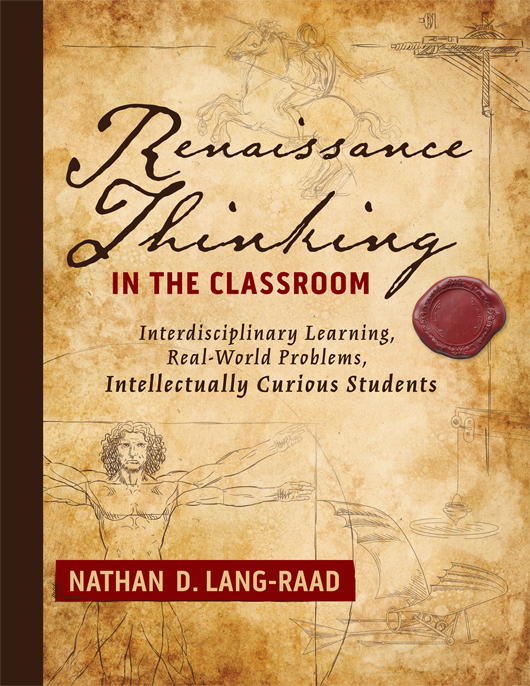Free Reproducibles
Renaissance Thinking in the Classroom
Interdisciplinary Learning, Real-World Problems, Intellectually Curious Students
Discover nine key thinking habits to cultivate in your K–12 students. This book helps educators explore habits, from fostering curiosity and taking risks to embracing lifelong learning. Author Nathan D. Lang-Raad dives into the challenge-based learning framework and how to integrate these habits with academic standards and 21st century skills.
Benefits
- Understand why the nine habits of thinking must be embedded and applied across all grade levels.
- Use a detailed challenge-based framework template to design and perform interdisciplinary lessons.
- See how historical polymaths’ practices can apply to and enhance 21st century learning.
- Complete chapter activities to ensure the habits are appropriately incorporated for all developmental stages and grade bands.
- Study research-supported examples of the habits’ and the framework’s successful application.
TABLE OF CONTENTS
Chapter 1: Foster the Nine Habits of Thinking in K–12 Learning
Chapter 2: Habit 1—Cultivate Diverse Curiosity
Chapter 3: Habit 2—Take Risks
Chapter 4: Habit 3—Use Humor
Chapter 5: Habit 4—Create and Innovate
Chapter 6: Habit 5—Self-Regulate
Chapter 7: Habit 6—Transfer Learning
Chapter 8: Habit 7—Ask Questions
Chapter 9: Habit 8—Evaluate Evidence
Chapter 10: Habit 9—Embrace Lifelong Learning and Perseverance
Chapter 11: Integrate the Challenge-Based Framework and the Habits of Thinking
Chapter 12: Integrate Academic Standards
Chapter 13: Integrate 21st Century Skills
Chapter 14: Engage Teacher Collaboration
Chapter 15: Engage Student Collaboration
PRINTABLE REPRODUCIBLES
Chapter 1: Foster the Nine Habits of Thinking in K–12 Learning
Chapter 6: Habit 5—Self-Regulate
- Figure 6.1: Student Self-Regulation Check—Secondary
- Figure 6.2: Student Self-Regulation Check—Elementary
- Figure 6.3: Student Goal-Setting Template
Chapter 8: Habit 7—Ask Questions
Chapter 8: Habit 7—Ask Questions
Chapter 11: Integrate the Challenge-Based Framework and the Habits of Thinking
SUGGESTED RESOURCES
BOOKS
- Conzemius, A. E., & O’Neill, J. (2014). The handbook for SMART school teams: Revitalizing best practices for collaboration (2nd ed.). Bloomington, IN: Solution Tree Press.

